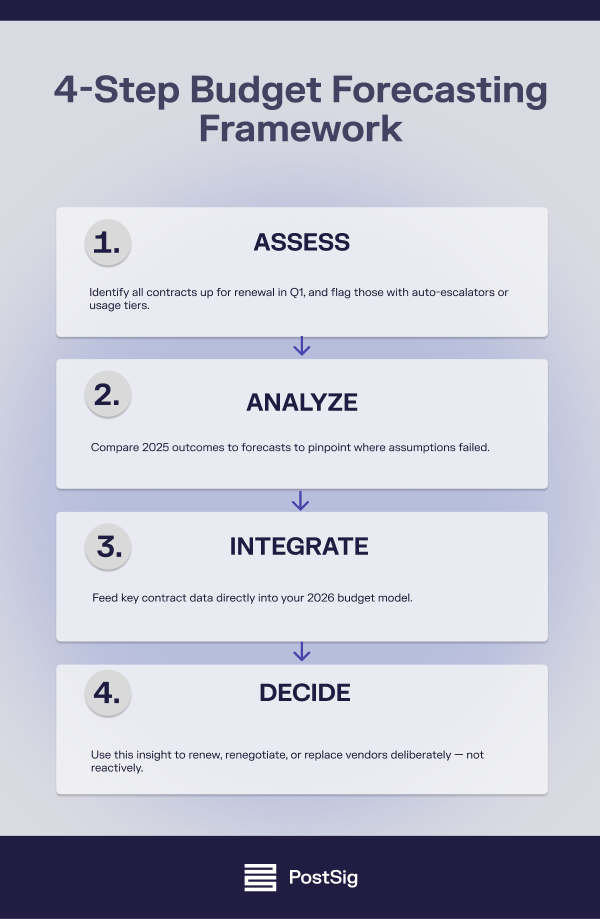Family Office Budget Season 2026: Closing the Contract Intelligence Gap
Don’t Budget Blind on 30% of Your Obligations
It's October, and CFOs across family offices are deep in the annual ritual of budget planning for 2026. Spreadsheets are flying, department heads are justifying increases, and everyone's scrambling to forecast vendor costs for the coming year.
But here's the uncomfortable truth: most family offices are still building next year's budgets in the dark. Across the industry, 20–30% of vendor obligations remain hidden— locked inside contracts no one has reviewed since signing. Auto-renewals trigger silently. Price escalations accumulate quietly. Usage-based fees expand faster than anyone projected.
While your team is modeling every line item, the largest budget category, vendor and data contracts, there remains a black box of surprises waiting to derail even the most disciplined financial plan.
Hidden Variables in Your 2026 Budget
For many family offices, the budget is carefully modeled and defended, only to unravel mid-year when vendor contracts reveal surprises that weren't accounted for.
Surprise auto-renewals remain one of the most common budget disruptors. Agreements quietly renew at rates that were never forecasted. A contract signed years ago, tucked away in a folder, suddenly renews at a higher rate with no opportunity to renegotiate. That escalation wasn't in the spreadsheet, but it's now on your expense line. One family office recently faced a $400,000 auto-renewal that slipped through unnoticed—an avoidable cost that reshaped their mid-year allocation.
Equally costly are automatic price escalation clauses—provisions buried deep in contracts that trigger annual percentage increases, often indexed to inflation or vendor pricing policies. These clauses can quietly add 5-10% to contract value each year without triggering alerts or reviews. When stacked across multiple vendors, they erode margins faster than any discretionary spend.
The fine print doesn't stop there. Many agreements include cancel-by or renew-by dates that fall months before the actual renewal date. Missing a four-month advance notice window means you're locked into another full term—often at higher rates—before the budgeting cycle even begins. These early notice periods are especially problematic for lean family offices, where a single missed reminder can result in tens or hundreds of thousands of dollars in unplanned costs.
And then there's the wildcard of compliance costs. Regulations such as the EU's Digital Operational Resilience Act (DORA) mandate contractual clarity around resilience, continuity, and oversight. Missing clauses or outdated language force family offices into expensive, last-minute legal reviews or even fines.
Together, these variables, including auto-renewal surprises, price escalations, cancel-by or renew-by dates, and regulatory obligations, create a layer of unpredictability that undermines even the most disciplined planning. Hidden risks aren't isolated line items; they're embedded across the vendor landscape, waiting to surface at the worst possible time.
What Modern Family Offices Do Differently in Budget Season
Effective family offices no longer treat contracts as static documents that live outside the financial planning process. Instead, they integrate contract intelligence directly into the planning, building budgets on real-time data, not assumptions. With a clear, twelve-month view of upcoming renewals, price escalations, and cancel-by windows, finance teams can create forecasts that reflect reality rather than best guesses. This shift provides not only accuracy but confidence—both internally and in front of principals and boards.
Family office finance teams also leverage contract intelligence to sharpen scenario planning. By understanding which contracts offer flexibility and which are rigid, teams can model out potential renegotiations, consolidations, or reallocations before they're forced to act. That level of foresight enables more strategic allocation of resources, ensuring that spend aligns with investment priorities and long-term goals.
Perhaps most importantly, these practices change how budgets are received. A budget backed by clear, defensible contract data carries more weight with stakeholders. It demonstrates rigor, reduces the risk of mid-year re-forecasts, and establishes finance as a proactive steward of the office's resources.
The Q4 Contract Intelligence Audit
Before finalizing your 2026 plan, use Q4 to close the visibility gap. A structured contract audit clarifies what’s renewing, changing, or escalating — and puts you back in control.

PostSig makes this audit actionable by giving you complete contract visibility in one easy-to-use interface. By connecting contracts, amendments, invoices, and renewals in real-time, you can execute each step without hunting through folders or piecing together information from multiple systems.
Where Accurate Budgets Begin
The family offices that consistently deliver highly accurate budgets and avoid mid-year surprises have one thing in common: they've transformed contract management from a reactive filing system into a proactive intelligence platform. They don't just track what they spent—they anticipate what they'll spend and why.
Budget season doesn't have to be guesswork punctuated by vendor surprises.
Ready to build your 2026 budget on complete contract intelligence rather than best-guess projections? Talk to us about our current assessment offer.


